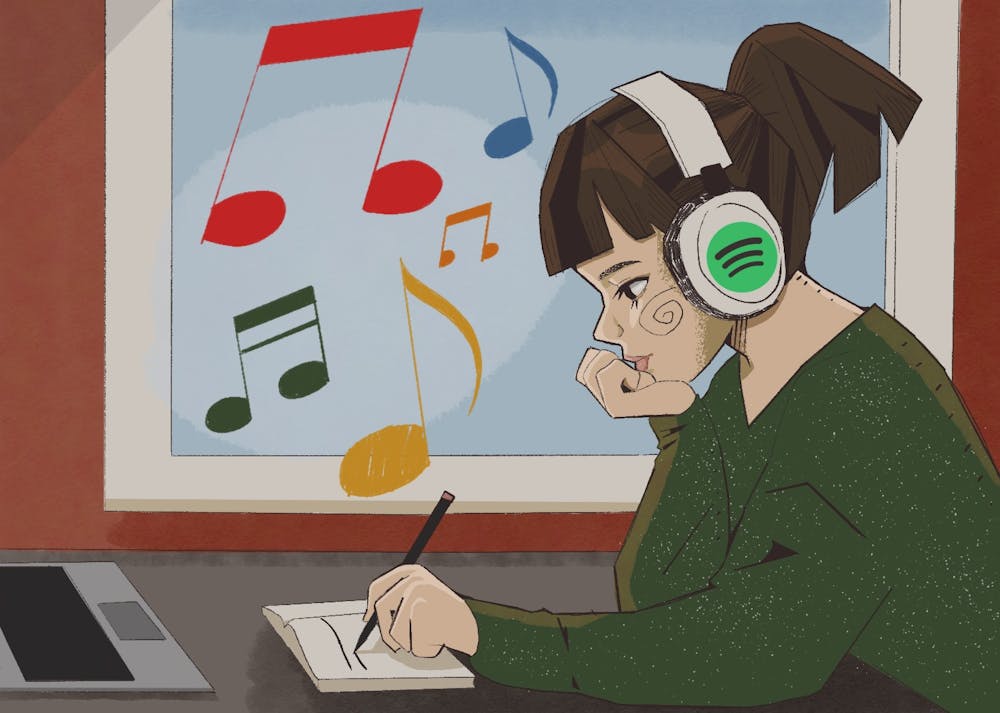Since its founding in 2006, Spotify, and audio streaming services like it, has altered the way we listen to music.
Currently, if you wanted to listen to a specific song, you'd simply have to input the name into a search bar at the top of your Spotify page. Back in the early 2000s, the musical era between the death of cassette and VHS tapes and the rise of CDs, to find a specific song you'd either have to dial through stations that might already be playing the tune, or search through your case of burnt disks.
The music industry is a versatile, fluid and ever-changing industry dependent on what's new and what's catching the attention and ears of consumers. Where record labels once relied on radio stations to amplify their artists, audio streaming services reign in a new era of promoting music.
"I've honestly had an exceptional experience with Spotify and its mission to get my music heard by my listeners and newcomers that stumble upon my songs," Metallic Malik, local rapper, songwriter and a junior majoring in interdisciplinary arts and performance, said in an emailed statement. "Nonetheless, Spotify has made music more accessible to the public and has helped create many careers for those in the music industry."
"The ease of producing music at home and uploading it for the entire world to hear is an awesome power," local ASU band 3IDragon said in an email. "We have the potential to not get people just from ASU or Phoenix or Tempe to enjoy our music, but literally the entire planet."
READ MORE: For the Record: Trailblazing ASU's Popular Music Scene
Data analytics like Billboard's Hot 100 or Top Mixes on Spotify look at statistics from both radio and streaming services to determine popularity and trends within the music industry. Radio stations can then use these analytics to select hit songs in order to attract more listeners.
Audio streaming services are also changing with the times to fit a more modern mode of appeal for users. Spotify uses a more social media-esque take on their platform; offering listeners personalized mixes, curated playlists and, of course, the popular year-end Spotify Wrapped, where users get a breakdown of their own musical analytics from over the year.
"My general usage overall, is always going to be either listening to the music that I favorited, but more importantly, that music comes from the Discover Weekly playlist that they have," said Ryan Geiser, a sophomore studying vocal performance. "It's just how I get the music I like because I don't really hear it anywhere else."
"I know a bunch of my friends who post their Spotify Wrapped statistics on Instagram," said Rachelle Cortina, a senior studying psychology and music therapy. "So I feel like for those people, they're more inclined to use it and ... if they have Spotify Premium, that also adds another bonus."
According to Demand Sage, an online data and analytics reporting site, Spotify has accumulated quite the user pool. With over 489 million monthly users — 41.9% of which are premium users — 11 million creators and a music catalog containing over 100 million songs, Spotify has become the most popular music streaming service in the world.
"It's surprisingly easy to get your recording on major streaming platforms. Getting people to actually listen to the music is the hard part," 3IDragon said in an email. "Music can get placed on curated playlists but it has to meet certain criteria, including a minimum number of streams. So even though our potential audience is bigger, there's still work involved to get people to listen."
READ MORE: Slug Bug to be Devilpalooza opener after winning Battle of the Bands finale
With its popularity surge, Spotify's revenue doubled in the past six years. In fact, in 2022, Spotify paid over $8 billion to artists.
However, with songs' worth averaging at an estimated $0.006 - $0.00318 per stream, artists need to garnish quite the listening platform in order to actually make a profit.
"In today's music industry, artists' revenue comes primarily from ticket sales and merch," said 3IDragon. "It's been a while since we've crunched the numbers, but we earn less than a penny for every stream of our music."
"(Spotify) changed the way money is made too because the value of a stream is far less valuable than the selling of a CD or a record," Metallic Malik said in an email.
With the usage of music streaming services growing and the public's dependency on radio decreasing, Spotify could be the platform that makes or breaks an artist’s career.
"I would encourage artists that are ... looking to create careers in music to do the research on what it takes to make it. It goes far beyond just making the music to become an established artist," Metallic Malik said in an email. "Promoting your music, branding your music, and taking ownership of your music are all things that play a huge factor in determining where you will land in the long run ... You just have to play the game right."
You can stream Metallic Malik’s latest release "PURPOSE" and 3IDragon's new single "Marmalade" on Spotify.
Edited by Claire van Doren, Reagan Priest and Caera Learmonth.
Reach the reporter at amvald11@asu.edu and follow @anxieteandbread on Twitter.
Like The State Press on Facebook and follow @statepress on Twitter.

Analisa Valdez is a reporter with the Echo, focusing on covering the arts and entertainment world. Analisa has been apart of the State Press for two and a half years and is in her third year at the Walter Cronkite School of Journalism and Mass Communication.




